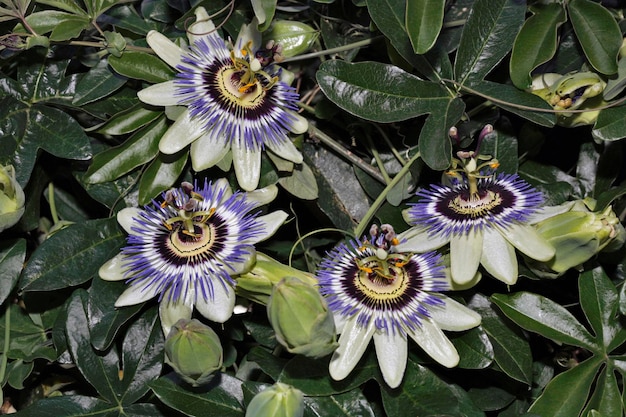History and Etymology
For centuries, natives of both North and South America have used passion flower for food, drink, and therapeutic purposes. European explorers were introduced to the plant, and by the 18th century, it became popular in Europe as a remedy for epilepsy and insomnia. Today, passion flower is cultivated worldwide.
Despite its name, “passion flower” is not an aphrodisiac. The “passion” actually refers to the Passion of Christ. In the 15th and 16th centuries, Spanish missionaries in Peru saw the flower as a symbol of the crucifixion. The blue and white colors represented heaven and purity, the radial filaments symbolized the crown of thorns, and the tendrils represented Roman whips.
Passion Flower Species
The genus Passiflora includes over 500 species, many of which are hybrids. Passiflora incarnata, also known as maypop, is the most valued for its therapeutic benefits. It is native to the southern United States but is used worldwide.
Passiflora edulis
Passiflora edulis, a South American species, is widely cultivated for its fruit, known as passion fruit. This fruit comes in two varieties: the standard purple fruit and a yellow variety.
Passiflora alata
Passiflora alata, also known as wing-stem passion flower or fragrant granadilla, is another South American species. It is known for its therapeutic applications and prized for its fruit. It has received the British Royal Horticultural Society’s Award of Garden Merit.
Passiflora quadrangularis
Passiflora quadrangularis, or giant granadilla, produces the largest fruits of all Passiflora species, about the size of a football. These fruits are used in desserts, juice, and medicine. The leaves are made into tea and poultices.
Health Benefits of Passion Flower
In the United States, passion flower is considered alternative or complementary medicine, but it has more mainstream acceptance in Europe. It is listed in the European Pharmacopoeia and approved in Germany for nervous restlessness, sleeplessness, and anxiety-related gastrointestinal concerns. The stem, flowers, and leaves are particularly beneficial.
Promotes a Balanced Mood
Passion flower is known for its relaxing and calming effects. Studies have shown it supports a balanced mood without harmful side effects. While prescription medications work faster, they often cause dizziness and job-related impairment. Passion flower is gentler.
Combining passion flower with other calming herbs can increase its potency. A study found that a combination of passion flower, valerian, and St. John’s wort had positive effects on mood without causing cognitive impairment.
Promotes Restful Sleep
Passion flower is commonly used to support restful sleep, and multiple studies confirm its effectiveness. A 2011 study found that participants who drank passion flower tea reported better sleep quality than those who took a placebo.
Effect on Involuntary Muscle Contractions
Some studies suggest that passion flower extract delays the onset and decreases the duration of involuntary muscle contractions. It also seems to reduce negative feelings after these episodes, unlike standard treatments. More research is needed to confirm these findings.
May Ease the Symptoms of Withdrawal
Passion flower may help alleviate withdrawal symptoms. A study found that a daily serving of passion flower extract helped with both physical and mental symptoms of withdrawal without side effects. Animal studies suggest it may reduce nicotine withdrawal symptoms, but more research is needed to confirm this in humans.
Other Health Benefits
Passion flower offers many potential benefits. It has been found to have aphrodisiac effects in mice and may promote balanced blood sugar, a property known in traditional Ayurvedic medicine. Research suggests it could also support comfort, respiratory health, digestive health, and attention and focus. Passion flower extract may enhance the absorption and effectiveness of some medications.
Passion Flower Active Components
Different species of passion flower contain similar but distinct compounds. Identifying the exact components responsible for its health benefits is challenging. One theory credits a particular alkaloid compound, harmine, which has various pharmacological effects. Harmine helps slow the breakdown of neurotransmitters, improves insulin sensitivity, relaxes blood vessels, encourages bone health, and supports a balanced mood.
Passion flower also contains several flavonoids, including apigenin, orientin, swertiamarin, quercetin, kaempferol, vitexin, and chrysin. These phytochemicals may contribute to its therapeutic effects. Flavonoids are known for their neuroprotective activity and soothing effects.
Another possible mechanism is gamma-aminobutyric acid (GABA), an inhibitory neurotransmitter that induces relaxation and sleep. Passion flower may boost GABA levels, promoting relaxation. However, due to the variation in species and administration methods, these findings are not yet conclusive.
Passion Flower Side Effects and Safety
When used as recommended, passion flower is considered safe for most people. However, taking extremely large servings can cause adverse effects. It should not be combined with sedatives, drugs, or alcohol, as this can cause dizziness or confusion. Pregnant women should avoid passion flower due to its potential to cause uterine contractions. Always consult a healthcare practitioner before starting a new supplement routine.
Available Forms of Passion Flower
Passion flower can be consumed in various ways. The fruit can be eaten raw or made into juice, jams, dessert toppings, and smoothies. The leaves, flowers, and stem can be dried or used to make powders, tinctures, infusions, and extracts. Passion flower herbal tea is popular and often used as a sleep aid. It is also available in nutritional supplements, both alone and blended with other botanicals. Global Healing incorporates passion flower into its brain and mood support supplement, Stress Relief.
The first Americans knew of the mood-supporting, sleep-enhancing powers of passion flower. Today, we are rediscovering these benefits and more. If you experience unhappiness or restless sleep, passion flower might be worth a try.

